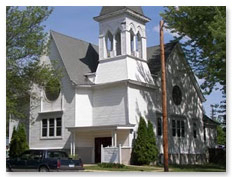Typical Beliefs
In the early 1800's many new churches formed on the American
frontier that became known as the ďRestoration Movement.Ē The two
best-known leaders of that era were Barton Stone and Alexander Campbell.
Their passion was to honor Jesusí prayer in John 17 seeking the unity of
all his disciples. Therefore they set out promoting world
evangelism by practicing unity in the church based upon the restoration
of Biblical authority and the essential elements of New Testament
Christianity.
People in this fellowship refuse to embrace historical creeds as
conditions or specific terms of fellowship and reject formal denominations or a clergy
class as controlling over local congregations. Instead, they insist
on relying on the Scriptures alone as the foundation for faith and
practice. Furthermore, since each congregation is self-governing under
Christ, individual churches may differ from one another on
non-essentials. In these distinctions, a respectful appreciation of the
different points of belief or practice of other Christians is
maintained, while holding on to a higher ideal... the unity of the
Church through faithful obedience to Jesus.
Many local churches have adopted statements of their core beliefs to
inform the public about the nature and practice of their congregation.
Grace Christian has not done that. Instead, we are providing some
examples of concise and readable statements of beliefs that we think are
representative of what we teach and practice.
The statement below was published on the web by a leading Christian
University, affiliated with independent Christian Churches and Churches of
Christ. Grace Christian Church is one of the kind of local churches that
support colleges of this sort. The following points must be considered
to be generally descriptive. Local congregations as well as colleges and
other mission agencies commonly list their positions to help others
understand them. This is what Lincoln Christian University (Lincoln, IL)
once published on their web. Here at Grace Christian
Church, we think this is a good description of what we believe, too.
God is one being in three personsóGod the Father, God the Son, and
God the Holy Spirit. He is the source of all creation (Gen. 1:1; John
1:1-2), which He sustains (Col. 1:17) and is in the process of redeeming
(Rom. 8:19-22). God the Father loves us and desires that we have
fellowship with Him as His children (I John 1:3).
Jesus of Nazareth is the incarnation of God the Son. He is the Word
become flesh (John 1:14), and He now holds all authority in heaven and
on earth (Matt. 28:18). He is Savior and Lord. He made human salvation
possible through His life, death on the cross, and resurrection. He
ascended into heaven where He is now our high priest and advocate. He is
head of the Church.
The Holy Spirit works actively in the world, seeking to glorify
Jesus. The Holy Spirit convicts people of sin, righteousness, and
judgment to come (John 16:5-11). The Holy Spirit indwells believers
individually and corporately in the Church. The Holy Spirit develops
within the Christian a pure heart which results in Christ-like character
expressed in private and public conduct and action.
The Bible, the Old and New Testament Scriptures, is the uniquely
inspired Word of God (2 Tim. 3:14-17; 2 Peter 1:16-21). The Bible is the
rule of faith and practice for Christians. We affirm that Scripture is
the authoritative revelation from God by which we know Godís will and
Christís authority. We seek to assert what the Scriptures clearly assert
and allow freedom in other cases. We seek to understand divine intent,
through authorial intent, and we seek to apply its teaching to the
contemporary church and culture.
The Church is the body of Christ on earth, the community of believers
throughout the world. Upon surrender to Christ, a person is added to the
Church. In addition, the priesthood of all believers means each
Christian is called to be a serving minister (1 Peter 2:9-10). The
Churchís mission is the Great Commission (Matt. 28:18-20).
Human beings were created by God to walk in fellowship with Him.
However, all (except Jesus) have sinned and fall short of the glory of
God (Rom. 3:23) and must rely on Godís grace and forgiveness. Every
human from the moment of life is in the image of God (imago dei), a
person to be nurtured, protected, and developed.
Salvation is by God alone through Jesus Christ alone. One accepts
Christ as Savior through a conversion process that includes faith,
repentance, confession, and baptism (Acts 2:38, 8:12, 10:47-48,
Rom.10:9, etc.).
In baptism a believer is immersed, crucified and buried with Christ
(Rom. 6:3-4), receives forgiveness of sin and the gift of the Holy
Spirit (Acts 2:38), is resurrected (Col. 2:12) and clothed with Christ
(Gal. 3:27), and becomes saved (1 Peter 3:21) because of Godís free gift
of grace received by faith.
The Lordís Supper is the celebration of the New Covenant, in which
the Christian community remembers Christ and celebrates the covenantal
relationship they have with Him and with each other. Congregations in
the fellowship typically celebrate the Lordís Supper at least weekly (I
Cor. 11:17-34; Acts 20:7).
The Final Coming of Jesus is a time when Christ will personally come
again as savior and judge of the world. At that time there will be the
bodily resurrection of the deadóbelievers to eternal life with God and
unbelievers to eternal judgment. Sin will be no more and believers will
live in fellowship with God forever (I Thess. 4:13-18 and Rev.
20:11-15).
|

